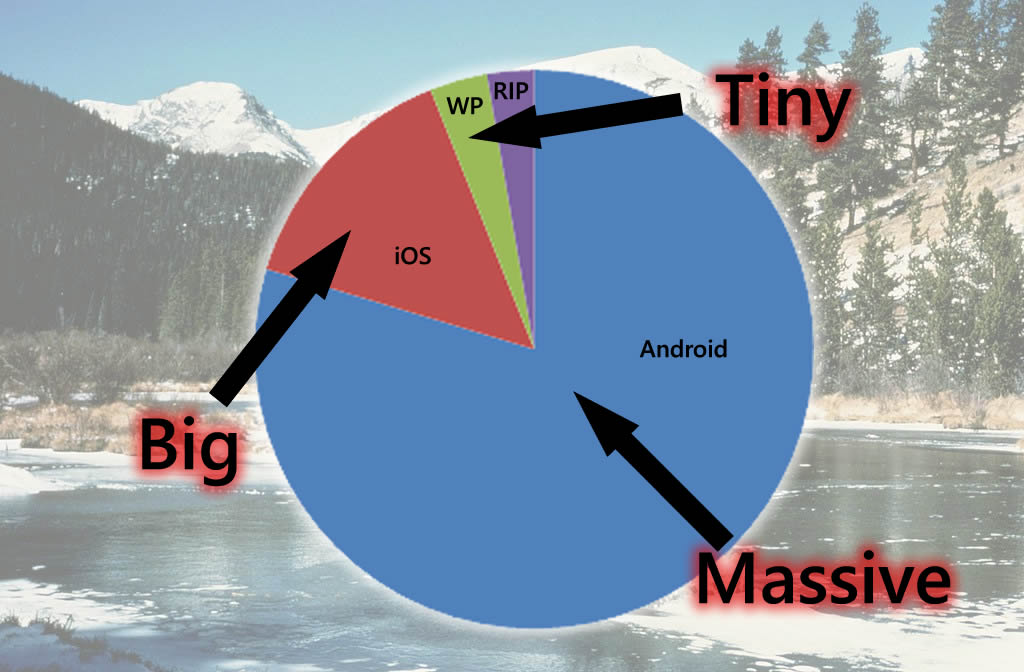Developing for niche platforms is illogical (and dangerous)


I can't read BlackBerry's "special committee" announcement this week as anything other than the company throwing in the towel. It's sad for the employees who've diligently worked to try and shift the company into the post-PC era, but what those third-party developers working equally hard to build apps for the ecosystem?
This is something I've been wondering for a while. It's quite common to find developers who target the tiny platforms -- and I include Windows Phone in this -- on the rationale that it's easier to be successful on those smaller platforms.
Now those developers have a real problem.
Logic
Here's the assumption developers do that use: "I want to be a big fish, small pond."
OK, but there's a major problem with a "small pond", and it's this: "the pond is small".
Where a lot of the confusion comes here is that we know that certain brands do rather well having a small pond. The total number of people who can afford a Ferrari is far smaller than the total number of people who can afford a Ford. Wherever you see successful companies operating well within a small pond, there's a good reason for it.
The most common case is because the pond represents a collection of affluent customers and you're selling a premium product. Or you're selling a product that is some other way specialised or niche.
What I hear from developers who target a platform in order to get a small pond is an argument that is not related to any form of niche specialisation. And, again logically, there can't be. There are no substantial differences between the smartphone platforms that can create a hook for any sort of specialisation.
It's how those people define the pond that is broken. For example, Microsoft are defining the small pond for Windows Phone by not selling as many smartphones as Apple and the Android vendors.
To illustrate, I've randomly picked an app off of the Windows Phone store called WineTable. Looks like an interesting app -- "Pair food and wine like a Sommelier!". Great, but that's not available for iOS, or Android. Yet you can't say that only Windows Phone users want to be able to pair food and wine like a sommelier. All smartphone users might have that desire.
(I have asked WineTable about their intentions for other platforms, and I'll update this article when I receive a response.)
So why intentionally target a phone that's got a market share on shipments 3.3 percent. If they had targeted iOS and Android, they would have had 93.2 percent. All they've done is limit their market in an artificial and unnecessary way.
Marketing
Second thing I hear: "Ah, but it's easier to sell into a smaller pond!"
A couple of years ago I wrote a piece for the Guardian that mentioned that cottage industry development was interesting, but the only reason for building for indie developers building apps was career development.
I think that's totally the case today. It doesn't matter how big the pond is, the market is now so mature that the marketing costs involved in creating a truly successful app means that chances of one guy or gal sitting in their bedroom hacking out an app in their spare time and making it is now about as likely as being savaged by a white tiger just after being struck by lightning and winning the lottery all at the same time.
However, all professional developers learning this new mobile stuff in their spare time can take that to the bank with their current and future employers in all sorts of ways.
Of course, this all depends on what you mean by "truly successful". If you just want to earn some pocket money, or you have income requirements that are fairly modest, creating a lifestyle business is an option. Just don't go sketching out your designs for your superyacht.
Let's say you still want to build that app and have a modest business on the side. First off, that's wrong. What you actually want to do is "build a modest business that has an app" -- it's that way round, not the other.
The platform isn't going to help you market the app significantly. Yes, if you build a good app that's doing a good job of ticking the boxes the platform owner wants ticked, they will help you, but you can't depend on that. You need to market your business, not the app, and that process is constant and ongoing.
So then we're back to the point illustrated by WineTable. Their business is helping people who like wine to get more out of the wine experience. The software used to do that -- their app -- is secondary.
Conclusion
BlackBerry this week has proved the danger of putting all your eggs in one, tiny, fragile basket.
Regardless, the same problem exists on Windows Phone. The "big fish in small pond" rationale is a fallacy. The market for your business is the people in the market themselves and their needs and desires.
It is not the smartphone they happen to be using. Always, always target the biggest market you can and don't create artificial barriers to success.
What do you think? Post a comment, or talk to me on Twitter: @mbrit.
Image credit: Wikimedia